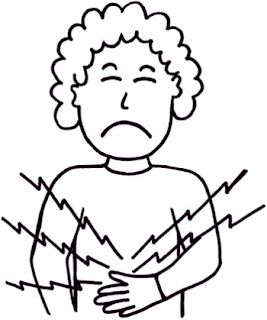5 Ways for Getting Rid of Gas
It's tough to be serious about flatulence, though we promise to try. It's tough because even the scientists who study the subject poke fun at their own research, writing of failed experiments that ended "without even a whiff of success."
Yes, the pun was intended and was in very bad taste, but such is the nature of this science-even at the highest levels. "An attempt to pump some data into a field felled largely with hot air."
Hot air, perhaps, and a colorful history as well. Hippocrates investigated flatulence extensively, and ancient physicians who specialized in it became known as "pneumatists." In early American history, such great men as Benjamin Franklin taxed their minds seeking a cure for "escaped wind."
In more recent times, digestive disease expert, wrote that "glaring at the next guy, when all else fails, can make life easier." Yes, it's tough to be serious about flatulence, but we promise to try... Read on carefully the 5 ways.
Lay off the lactose. If you are lactose intolerant, you could have flatulence problems from eating diary foods. Lactose-intolerant people have a low intestinal level of the enzyme lactose, which is needed to digest lactose, the type of sugar found in many dairy foods.
But you don't necessarily need to be diagnosed as lactose intolerant to have unwanted repercussions. Some people can only handle certain amounts and different kinds of milk products with comfort. If you or your doctor suspects that your favorite dairy product is causing your problem, try eating it in smaller servings or along with a meal for a day or two until you notice where gas begins to be a problem.
Avoid gas-promoting foods. The primary cause of flatulence is the digestive system's inability to absorb certain carbohydrates. Though you probably know that beans are sure fire flatus producers, many people don't realize that cabbage, broccoli, brussels sprouts, onions, cauliflower, whole wheat flour, radishes, bananas, apricots, pretzels and many more food can also be highly flatugenic.
Fight off fiber induced flatus. "Although we often encourage fiber in the diet for digestive health, some high fiber vegetables and fruits may increase health," says a professor at the University of Virginia Health Sciences Center.
If you are adding fiber to your diet for health reasons, start with a small dose so that bowel gets used to it. That lessens the increase of flatus, and doctors have found that most peoples flatus production returns to normal within a few weeks of adding fiber.
Use charcoal to help you reach your goal. Some studies have found that activated charcoal tablets are effective in eliminating excessive gas. Charcoal absorbs gases and may be useful for flatulence, it's probably the best available treatment - after appropriate dietary changes have been made and other gastroenterological diseases have been treated or ruled out." Check with your doctor if you're taking any medication because charcoal can soak up medicine as well as gas.
Get quick relief with popular OTC's. While many physicians are recommending activated charcoal for relief of intestinal gas, pharmacists say simethicone-containing products are still the most popular with consumers. Among the over-the-counter favorites: Gas-X, Maalox Plus, Mylanta II and Mylicon.
Unlike activated charcoal's absorbent action, simethicone's defoaming action relieves flatulence by dispersing and preventing the formation of mucous-surrounded gas pockets in the stomach and intestines.

Comments
Post a Comment